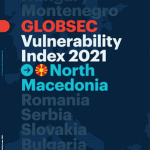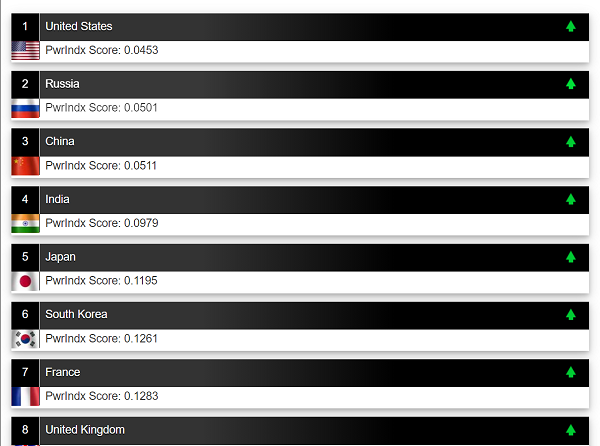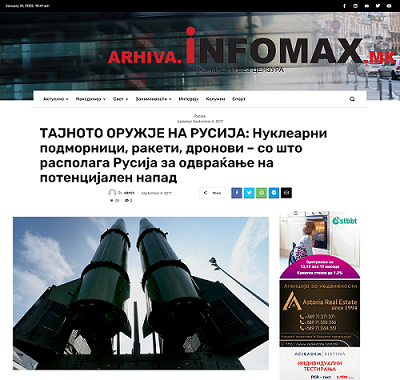The Manner of Creating Fascination with Russia’s Power in the Media and On Social Networks in North Macedonia
One of the simplest ways to influence a wider number of people is to glorify a country. Positive glorification can evoke admiration, a sense of belonging and community, a sense of protection, an ever-present refuge, an alternative available to citizens and the state… This is especially possible in times of stunted development or unfulfilled expectations or dissatisfaction with speed with which things are moving, in this case, the accession negotiations with the EU
Author: prof. Mirjana Najcevska, PhD, an expert on the rule of law and human rights
Demonstrating the power of a state can refer to cultural, scientific or some other type of power, but it is most striking when it corresponds to the emphasis on military power. Exactly this segment of possible influence is interesting and catches the eye when analyzing the influence that Russia has in the Republic of North Macedonia.
In general, North Macedonia is not too exposed, nor is it under any visible and strong influence of Russia. Regular monitoring of the vulnerability of the country from this kind of influence by the think tank GLOBSEC from Bratislava shows that N. Macedonia is moderately vulnerable and that it has mechanisms that manage to deal with it.
Fascination with Russia’s power exists and is transmitted both through the formal media and, moreover, through social networks and websites, but it is difficult to quantify and measure.
This is influenced by several factors.
First, analytical and investigative journalism is not developed in the country, but rather, copying and republishing news/information/analysis from other, mostly foreign media is practised. Considering that even in this transmission the media from which the text is being republished are not quoted, and even less often links are given to the specific texts, one can only assume from which source certain news/information is taken according to its content.
Second, there is a tradition of listening/watching/reading media coming from the neighboring Republic of Serbia. It is very difficult to determine the extent of citizens’ exposure to these media (many of which are very positive and non-selective when it comes to transmitting information related to Russia and its military power). The situation is worsening with the purchase of some of the media in the Republic of North Macedonia by Serbian owners. If this is put in the context of the analyses that indicate the great influence of Russia in the Serbian media, a conclusion can be drawn about that influence in the Republic of North Macedonia as well.
Third, social networks are an important source of information that is difficult to quantify. Trust in media outlets whose source cannot be verified is significant and unequivocally dangerous. Precisely because of the most informal way of conveying information, views, opinions, it is not easy to assess the level of impact it has on a wider circle of people.
What can be deduced from the analysis of the media in the Republic of North Macedonia is that Russia’s military power is talked about in a way and in a quantity that can not be found in any other country. The one-sidedness of the information is emphasized by the fact that in the media there are no relevant measurements and data from which one can see the military power of individual countries/alliances.

This fascination (in the way it is portrayed in the media) may or may not correspond to factual data (given that very few articles point to relevant data or sources for certain claims). In any case, the media are not opposed to different sources of data.
In some articles, the absence of sources and relevant data is replaced by giving details of specific types of weapons and/or armaments that should create the impression of relevance and knowledge. For example, one such article is entitled “A Killer Carrier Will Make Russia a Powerful Hypersonic Force,” which provides a very detailed account of the “new” weapons being developed by Russia. Or “Russian S-350 anti-aircraft systems coming to Crimea soon,” “Kaliningrad Fortress: The Russian army is rapidly forming a powerful division to defend important enclaves.”
Some of the articles are structured in such a way that at first glance they seem to send a message of concern (from Russia’s military power), but in a number of such cases, the entire text radiates admiration.
Usually, Russia’s military power is not part of a broader or more in-depth analysis, the mention is often made out of context (related to an event – celebration, maneuver, statements by senior Russian government officials) and has no comparative elements or balanced representation of the military power of other states.
Even when the media refers to an expert or specific analyzes undertaken by other media, it is very rare to provide a link that would verify their original form. In any case, there is no balanced view or reference to different analyzes (some praising Russia’s power and its readiness to defeat the United States, and others claiming the opposite).
The small number of serious analyzes of the distribution of military power in the media of North Macedonia give completely opposite data (about military power and powerlessness, but even more about the economic situation in Russia) on those spread by portals and media that fuel the fascination with the military power of Russia.
Interestingly, when we talk about the distribution of military power worldwide (and even a possible conflict), we are usually talking about the United States and Russia, and not about the balance of power or a possible conflict between Russia (or a structure led by Russia) and NATO.
Information about Russia’s military power is mostly part of the news transmitted through social networks, but it is not uncommon for it to find a place in established print and electronic media. Part of that trend is the oldest newspapers in North Macedonia such as “Nova Makedonija” with articles titled “Russia is powerful again and the West must oblige” and “Vecer” with “VIDEO | Russia successfully tests another hypersonic missile.”
Sometimes it is indirect messages related to the sale of weapons to neighbors or “friends” or simply an attempt is made to achieve an appropriate effect with a disparaging attitude towards NATO.
In this sense, the choice of terms used to describe Russia’s military power is also interesting. For example, it talks about ” All the power and beauty of the Russian army in one video: The Russian military TV channel broadcasts a spectacular video”:
The video was prepared by the team of the TV channel “Zvezda”. It shows the mastery of Russian military pilots, tankers, paratroopers, artillerymen and machine gunners. Scenes from the launch of Caliber rockets from ships, as well as scenes of attack by attack helicopters and target-launching aircraft, are shown. The scenes with the take-off of the strategic bombers Tu-160 ‘White Swan’ deserve special attention.
Much of the news related to Russia’s military equipment and military power, which is further transmitted on certain portals or even in reputable media in North Macedonia, is downloaded from the Russia Beyond portal. Most often in such cases, this portal is not indicated at all as a source of information/data, nor is it mentioned that the information is part of a network of media funded by the Russian government, which includes the parent publication “Российская газета” and Russia Today (RT).

In building the impression of grandeur and fostering a fascination with Russia’s military power, some secret and brand new weapons are often talked about.
No specific conclusions can be drawn from the articles presenting Russia’s military power (obviously that is not the purpose of the articles), nor are any negative connotations of such military power mentioned. Usually, only the impression of grandeur remains.
This type of article is frequent in situations of potential conflict involving Russia as a party to the conflict, such as the latest example with Ukraine.
At the beginning of the rise of tensions related to Ukraine, the media in the Republic of North Macedonia did not have too much analysis on the topic. It is interesting that in some of those that were made, there was more talk about what is bothering the Russians than about what worries the Western European countries. In some of the information related to the conflict over Ukraine, a very open side was taken with the use of appropriate wording and context in which the statements of senior officials on both sides are transmitted (“Let’s remember, Pentagon spokesman John Kirby” (according to the portal “Lokalno”) stated that Russia is allegedly preparing an excuse for the invasion of Ukraine, without providing evidence for those allegations,”…. “Until the evidence is presented, it will be considered fake news and false accusations against Russia.” – writes the portal “Observer” ).
The number of columns analyzing the relationship between Russia and Ukraine in the light of European values was even smaller. One of the few columns in which an attempt is made for a balanced approach, which tries to correlate with the developments in Macedonia and the attitude of European countries towards it, was published by the portal “Factor” in 2019.
The next level was to develop a positive perception of Russia’s military power and to accept their actions as desired. In articles such as “Peacekeepers withdraw from Kazakhstan” published by the portal “Express” in January 2022, they become peacekeepers, with a clear peace role. Sometimes a positive perception is well packaged in a seemingly objective text.
This impression is emphasized by the quiet admiration for Putin’s tactics or “NATO disunity” and Western European countries, i.e. the “western” disinterest in Ukraine, as well as by the one-sided portrayal of Russia as a victim.
All of this can foster a generally positive attitude toward Russia, softening the perception of Russia as someone who uses its military power to expand its own influence and creates a perception of Russia as a possible protector, not a possible aggressor.
In the context of the large presence of articles from the Serbian media that nurture a negative approach to NATO, this is gaining momentum.
The number of information and articles on the relations between Russia and Ukraine that show the overall situation and from another perspective is increasing with the growth of the possibility of conflict, i.e., the entry of Russian military forces into the territory of Ukraine in the last weeks of January to gain enormous proportions. In January 2022, articles appeared for the first time talking about military power and military assistance that the United States and NATO are beginning to manifest/provide in relation to the conflict.
Lack of original analysis
There are still no analyzes by local authors, but the source of information (at least in the larger established media) is, above all, the Western media.
The information that tries to give an objective picture of the situation is gradually gaining in number and largely “covering up” those who continue to broadcast anti-NATO content in some of the media and content that belittles any form of sanctions in the event of possible aggression by Russia, i.e. such aggression is presented as moral and justified.
However, the problem remains with the transmission of content that very openly promotes support for Russia in the conflict with Ukraine through social networks. Namely, the official information and the transmission of the escalation of the conflict given in a number of media are not transmitted further by the social networks, unlike the contents in which Russia is supported, which are transmitted through Facebook groups and informal groups that organize protests and declare themselves open opponents of NATO and silent supporters of Russia. Moreover, on informal portals and websites that do not have an impressum and transparent information about the ownership, such content is produced by people that some citizens perceive as serious journalists.
Informing about the views of Macedonian politicians regarding Russia
In recent years, Macedonian politicians in power have rarely spoken out about relations with Russia. When they do, they usually try to sound democratic and politically correct and in no case place open accusations against Russia. Thus, for example, in 2019, Prime Minister Zoran Zaev on the affair with Russian pranksters, which was officially described as a “hybrid attack” by government officials, said that “it is not an act of the Russian Federation, a country that is our friend.”
Regarding Russia’s conflict with Ukraine, the newly appointed Minister of Defense Slavjanka Petrovska gave open support to Ukraine for the first time. This statement was transmitted by a number of media in North Macedonia, but also caused an avalanche of insults and humiliation (which are again used to emphasize Russia’s military power).
In contrast, open support for Russia (even in the conflict with Ukraine) is given by a very small number of politicians and they are usually in the opposition. An even smaller number of politicians currently involved in government structures make statements that openly support Russia and oppose Macedonia’s NATO orientation.
One of them is MP Apasiev, who belongs to the Left Party (a party that won two seats in the 2020 parliamentary elections, and which in its election program clearly states that it is committed to Macedonia leaving NATO).
The leader of the party “Levica”, Dimitar Apasiev, met with the Ambassador of Russia in Skopje, Sergei Baznikin, in the representative “Struga Room” of the Assembly. The MP’s party says that the professor and the diplomat, among other things, discussed the famous tweet with which the Minister of Foreign Affairs Bujar Osmani gave his support to the United States in dealing with the tensions on the Russian-Ukrainian border.
Apasiev’s statements are aimed at a positive perception of Russia.
It can be concluded that in some of the media, portals and websites within the social networks in the Republic of North Macedonia, a channel has been built for constantly and quietly building a positive attitude towards Russia’s armed power and fueling the fascination of its magnitude.
It is very difficult to determine the true impact that this kind of information has on the general public, but the fact remains about the constant presence of this type of perception that can be easily thrown to the surface and multiplied in times of crisis and especially in conditions of growing dissatisfaction in the country from the (non)support it receives in the European integration processes.
All comments and remarks regarding this and other Vistinomer articles, correction and clarification requests as well as suggestions for fact-checking politicians’ statements and political parties’ promises can be submitted by using this form
